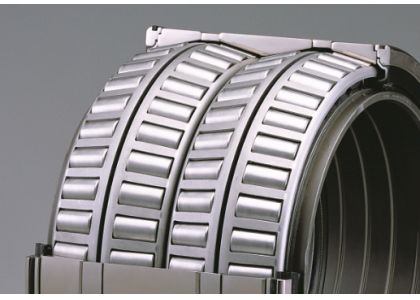INDUSTRY NEWS
Rolling Mill Bearings: Enhancing Efficiency and Reliability in Metal Rolling Operations

Introduction:
Rolling mill bearings are critical components in the metal rolling industry, providing support, stability, and controlled movement during the rolling process. This article explores the significance, types, challenges, and advancements in rolling mill bearings, highlighting their vital role in enhancing efficiency and productivity in metal rolling operations.
Importance of Rolling Mill Bearings:
In metal rolling operations, rolling mill bearings support the heavy loads and high forces exerted during the process. These bearings facilitate smooth and precise rotation of rolls, ensuring accurate thickness reduction, shape control, and surface quality of the rolled metal sheets or sections. Reliable and efficient rolling mill bearings are essential for achieving consistent product quality and optimizing overall production performance.
Types of Rolling Mill Bearings:
1. Four-Row Cylindrical Roller Bearings:
Four-row cylindrical roller bearings are commonly used as backup bearings in multi-roll rolling mills. They are designed to carry heavy radial loads and can accommodate misalignment, making them suitable for high-load applications.
2. Angular Contact Ball Bearings:
Angular contact ball bearings are utilized in rolling mills when axial load-carrying capacity is required. These bearings can withstand both radial and axial loads and are often used in work roll or backup roll arrangements.
3. Spherical Roller Bearings:
Spherical roller bearings are capable of accommodating misalignment and high axial loads. These bearings are commonly used in work roll or backup roll applications where extreme operating conditions and heavy loads are present.
Challenges and Requirements:
Rolling mill bearings operate in demanding conditions, including high temperatures, heavy loads, and rapid speeds. They must withstand these harsh environments while providing reliable and consistent performance. Key requirements for rolling mill bearings include high load-carrying capacity, exceptional shock resistance, low friction, and minimal operational noise. Additionally, proper lubrication and maintenance are critical to ensure their longevity and reliability.
Advancements in Rolling Mill Bearings:
1. Sealed Bearings:
Sealed rolling mill bearings incorporate advanced sealing technologies to prevent ingress of contaminants, such as scale and coolant, and retain lubrication within the bearing. This ensures longer maintenance intervals, reduced downtime, and improved overall reliability.
2. High-Temperature Bearings:
To withstand the elevated temperatures encountered in rolling mill applications, high-temperature bearings are designed with special heat-resistant materials and lubricants. These bearings maintain their performance and reliability even under extreme thermal conditions.
3. Integrated Monitoring Systems:
Modern rolling mill bearings are equipped with integrated monitoring systems to detect early signs of wear or impending failures. These systems provide real-time data on temperature, vibration, and load distribution, enabling predictive maintenance and minimizing unexpected downtime.
Applications of Rolling Mill Bearings:
Rolling mill bearings are primarily used in metal rolling mills, including hot rolling mills, cold rolling mills, and continuous casting lines. They are critical for manufacturing various metal products, such as sheets, plates, strips, rods, and sections, in industries such as steel, aluminum, copper, and aerospace.
Conclusion:
Rolling mill bearings play a vital role in the metal rolling industry, ensuring efficient and reliable operation of rolling mills. Their ability to withstand heavy loads, high speeds, and extreme conditions is crucial for achieving consistent product quality and optimizing production performance. With advancements in sealing technologies, heat-resistant materials, and monitoring systems, rolling mill bearings continue to evolve, meeting the demanding requirements of modern metal rolling operations. By investing in high-quality and properly maintained rolling mill bearings, manufacturers can enhance efficiency, reduce downtime, and ultimately achieve greater productivity and profitability.